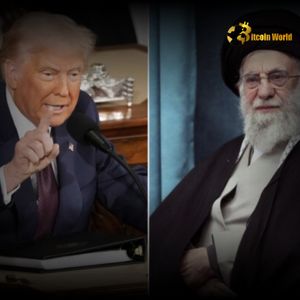Iran Nuclear Deal: Trump Warns of Danger Amid Nearing Conclusion
5 min read
BitcoinWorld Iran Nuclear Deal: Trump Warns of Danger Amid Nearing Conclusion In a world where global events can shift markets and influence everything from energy prices to investor sentiment, paying attention to major geopolitical developments is crucial. Recent statements from former U.S. President Donald Trump regarding the Iran nuclear deal have brought this critical topic back into the spotlight, suggesting a potential conclusion to ongoing discussions and raising important questions about the future of US Iran relations and the potential for Middle East conflict . What’s the Latest on the Iran Nuclear Deal Negotiations? Former President Donald Trump recently indicated that discussions surrounding a new agreement with Iran regarding its nuclear program are reportedly nearing a conclusion. This statement, while not providing extensive detail, suggests that diplomatic efforts are ongoing behind the scenes to find a resolution to a long-standing and complex issue. The core of these Iran deal negotiations involves finding a way to ensure Iran does not develop nuclear weapons in exchange for sanctions relief and other concessions. The history of this situation is layered: The Original Deal: The Joint Comprehensive Plan of Action (JCPOA), signed in 2015, saw Iran agree to significant restrictions on its nuclear activities in return for the lifting of international sanctions. US Withdrawal: In 2018, under President Trump, the United States withdrew from the JCPOA, reimposing stringent sanctions on Iran. Renewed Tensions: This withdrawal led to increased tensions, Iran gradually scaling back its commitments under the deal, and a heightened risk of confrontation. Current State: While the Biden administration engaged in indirect talks to potentially revive the JCPOA or negotiate a new arrangement, those talks have stalled at various points. Trump’s recent comments add another layer to the public understanding of the current state of play. Understanding the nuances of these Iran deal negotiations is key because the outcome has significant implications not just for the involved parties, but for regional and global stability. Why Are US Iran Relations So Tense? The relationship between the United States and Iran has been fraught with tension for decades, marked by mistrust, conflicting interests, and proxy conflicts across the Middle East. This complex history is a major factor influencing the difficulty of reaching any lasting agreement on the nuclear issue or other points of contention. Key factors contributing to the strained US Iran relations include: Historical Grievances: The 1979 Islamic Revolution in Iran and the subsequent hostage crisis. US support for Iraq during the Iran-Iraq war in the 1980s. Iran’s perception of US interference in its internal affairs. Regional Rivalries: Iran’s support for various non-state actors and proxies in countries like Lebanon, Syria, Iraq, and Yemen, which the US and its regional allies view as destabilizing. Competition for influence in the Middle East with US allies like Saudi Arabia and Israel. Ideological Differences: Fundamental differences in political systems and ideologies. Iran’s anti-US rhetoric and the US designation of Iran as a state sponsor of terrorism. These deep-seated issues make any diplomatic breakthrough, particularly concerning the sensitive topic of nuclear capabilities, incredibly challenging. Any progress in the Iran nuclear deal discussions must navigate this difficult terrain. Could This Lead to a Middle East Conflict? One of the most significant concerns raised by the current situation, and explicitly mentioned in the original statement, is the potential for a large-scale Middle East conflict . Trump specifically highlighted that a peaceful approach is preferred and that an Israeli attack could jeopardize any potential deal and escalate tensions dramatically. The risk of conflict stems from several sources: Israel’s Concerns: Israel views Iran’s nuclear program as an existential threat and has stated it will not allow Iran to acquire nuclear weapons. Israel has previously conducted strikes against nuclear facilities in other countries and maintains the option to act unilaterally if it believes diplomacy has failed and Iran is close to achieving a nuclear capability. Iran’s Response: Any attack on Iran’s nuclear facilities or military assets would likely trigger retaliation, potentially involving Iran’s conventional military, its proxies in the region (like Hezbollah), or cyberattacks. Regional Spillover: A direct conflict between Israel and Iran could quickly draw in other regional actors and potentially the United States, leading to a wider Middle East conflict with devastating consequences for the entire region and global economy. The possibility of an Israeli attack, whether perceived as pre-emptive or retaliatory, remains a volatile factor in the current diplomatic landscape. It underscores the urgency and fragility of the ongoing Iran deal negotiations . Navigating the Path to Geopolitical Stability Achieving geopolitical stability in the Middle East, particularly concerning Iran’s nuclear program and its regional activities, is a major objective for many international actors. However, the path forward is fraught with challenges and uncertainties. Challenges include: Challenge Description Mutual Distrust Deep historical and ongoing mistrust between Iran, the US, and regional allies makes verification and compliance difficult. Verification Mechanisms Ensuring robust monitoring of Iran’s nuclear activities is critical but technically and politically challenging. Sanctions Relief vs. Compliance Finding a mutually acceptable sequence for lifting sanctions and Iran returning to compliance with nuclear restrictions. Regional Security Concerns Addressing the concerns of US allies about Iran’s ballistic missile program and support for proxies, which Iran views as separate from the nuclear deal. Domestic Politics Political divisions within the US, Iran, and Israel can impact negotiating positions and the longevity of any agreement. Despite these challenges, the potential benefits of a successful diplomatic outcome are significant. A verifiable agreement on the Iran nuclear deal could: Reduce the immediate risk of Iran acquiring nuclear weapons. Potentially de-escalate regional tensions. Open pathways for future dialogue on other issues. Contribute positively to overall geopolitical stability . Conversely, a failure of diplomacy, coupled with an escalation of military actions, risks plunging the region into a wider Middle East conflict , with severe humanitarian and economic consequences. What Does This Mean for the Future? Trump’s statement that the Iran nuclear deal is nearing a conclusion, while requiring further official confirmation and detail, serves as a reminder that this critical geopolitical issue remains active. The interplay between diplomatic efforts, the complex history of US Iran relations , the ever-present risk of Middle East conflict , and the pursuit of geopolitical stability creates a dynamic and unpredictable situation. Whether a new agreement is indeed close, what its terms might be, and whether it can withstand regional pressures and domestic politics remain open questions. The coming weeks and months could be crucial in determining the trajectory of this situation, with potential impacts reverberating far beyond the immediate region. To learn more about the latest geopolitical stability trends and their potential impact on global markets, explore our article on key developments shaping geopolitical stability and its influence on market sentiment. This post Iran Nuclear Deal: Trump Warns of Danger Amid Nearing Conclusion first appeared on BitcoinWorld and is written by Editorial Team

Source: Bitcoin World



